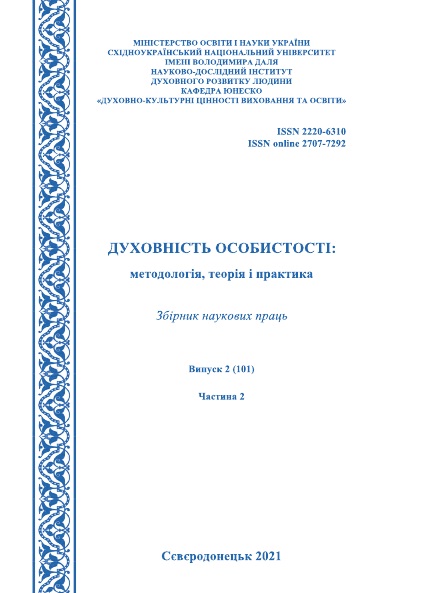RESEARCH OF EFFICIENCY OF MANAGEMENT OF DEVELOPMENT OF PROFESSIONAL COMPETENCE OF THE TEACHER: THE ORGANIZATION OF EXPERIMENT
DOI:
https://doi.org/10.33216/2220-6310-2021-101-2_2-129-140Keywords:
Modern teacher, professional competencies, management of professional competencies formation, ascertaining and forming experiment, educational processAbstract
The main purpose of the study was to determine the main methods of conducting an experiment to study the effectiveness of managing the development of professional competence of secondary school teachers.
Achieving the goal set at the stage of experimental research required solving the following tasks: to determine the criteria for effective management of the development of professional competence of teachers; to determine the method of diagnosis of these indicators, which ensures the receipt of reliable and reliable data in the experimental work; identify and summarize the data on the selected indicators and characterize the conditions for effective management of the development of professional competence of teachers. The study of the state of professional competence of primary school teachers was conducted by methods of questionnaires and testing, which were compiled in such a way that the answers required specification of knowledge, giving examples where the requirements of professional competence of primary school teachers should be taken into account.
The experimental study was conducted on the basis of the Sumy Classical Gymnasium. In total, the experiment, which lasted during 2020, covered 5 teachers and 2 representatives of the administration of the educational institution of II-III levels. The total number of the control group was 7 people. In the presented study, the degree of formation of professional competence in the respondents of the control and experimental sample who participated in the experimental work was determined by the following components: cognitive, formed from a system of knowledge about goals, purposes, ways of implementing teacher activities in the educational process and the subject of the educational process, ways to use this knowledge within the humanistically oriented interaction of the teacher and his students as participants in the educational process; activity-behavioral, formed from a system of culturally appropriate actions of the teacher, his behavior, skills of regulating the actions and deeds of all participants in the educational process according to the norms recognized by society in the education system; value-oriented, formed from a system of moral guidelines, guidelines and motives that determine the humanistic orientation of the teacher's actions in ensuring in the educational environment of natural rights and freedoms, the interests of each student as a participant in the educational process.
It was found that a modern teacher must be ready for the changes taking place in the education system, able to boldly make pedagogical decisions, show initiative and creativity. There is no doubt that the problem of effective management of the development of professional competence of teachers can be solved only if the high competence and professionalism of each teacher, his ability to innovate.

